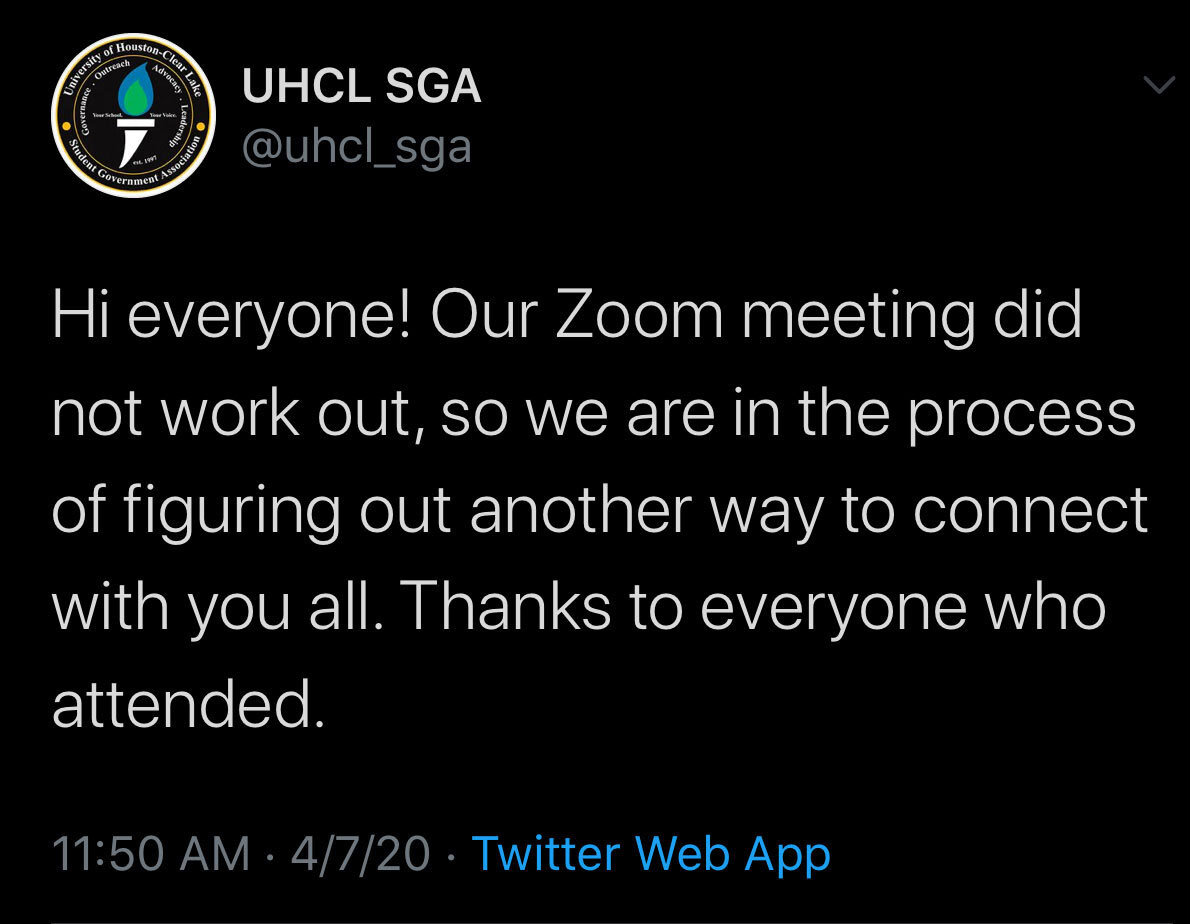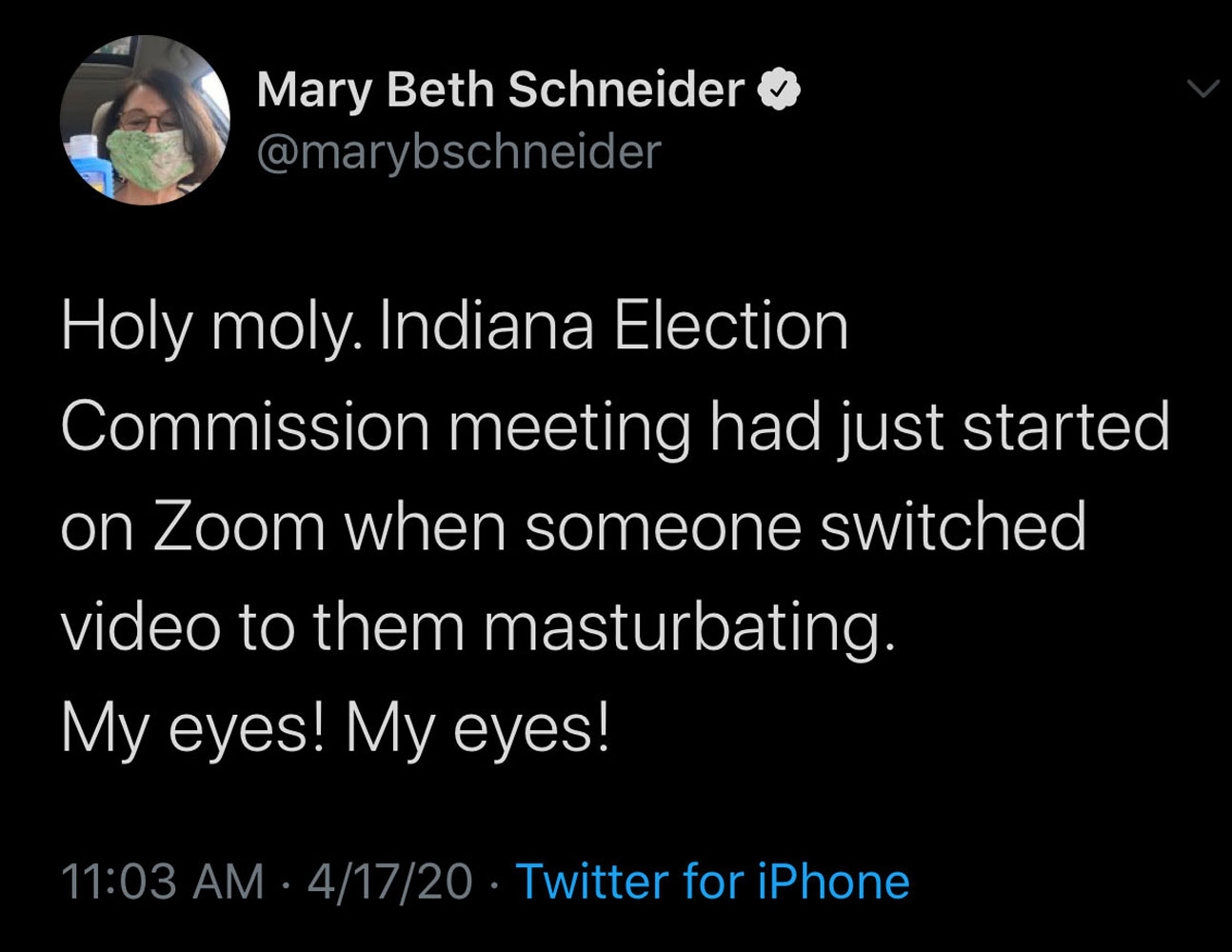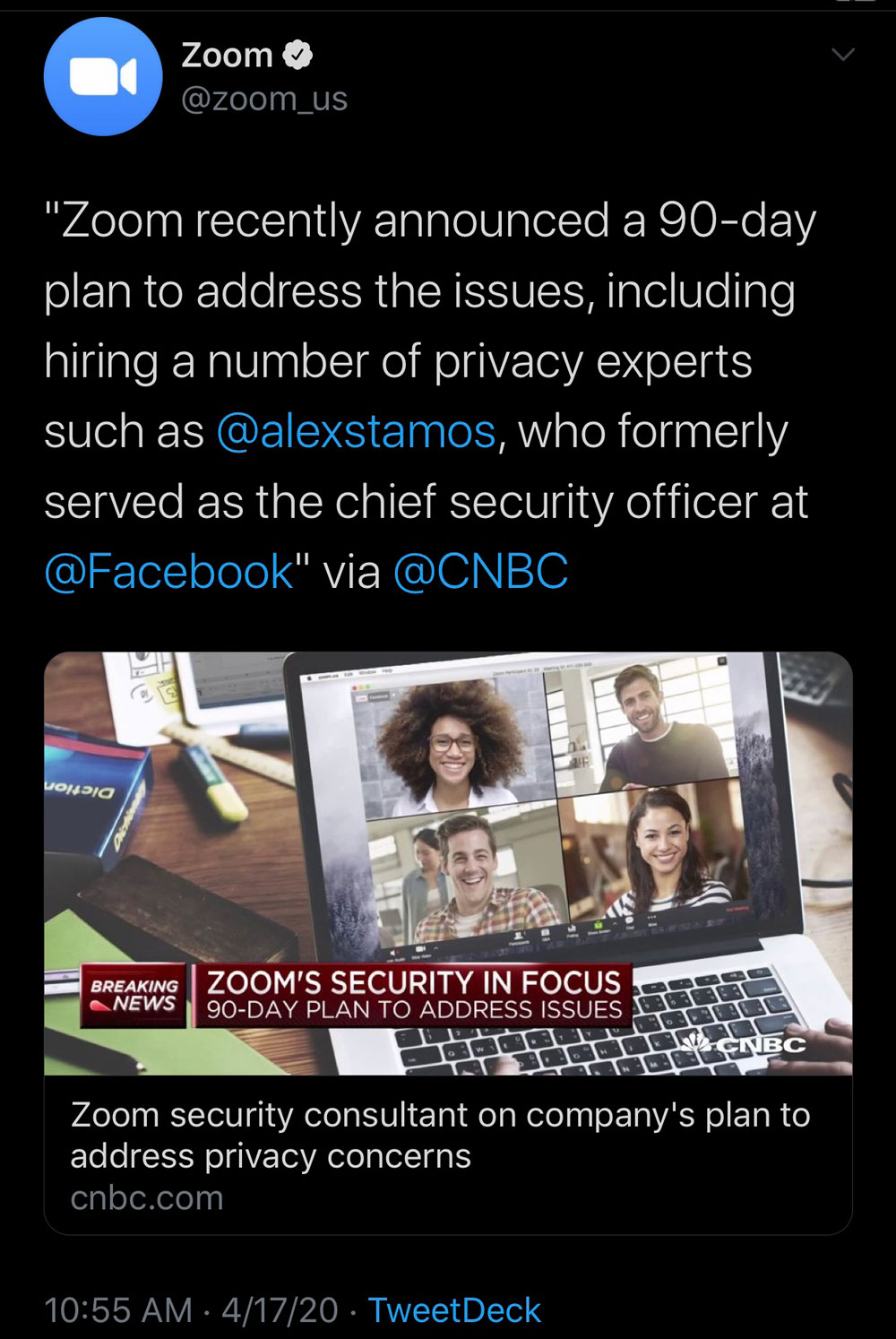EXPLAINER: Zoom disruptions cause for reevaluation of app usage
Zoom is a cloud-based audio and video conferencing app developed in 2011 by Eric Yuan that users can access on their phone, tablet or computer. This app allows users to chat with up to 500 attendees.
As one of the go-to apps during the COVID-19 global pandemic, Zoom announced in late February resources to support those navigating the outbreak. Zoom usage grew overnight, and the company reached over 200 million daily meeting participants in March 2020.
The company, unfortunately, fell short on privacy and security expectations. Users began to experience incidents dubbed as “Zoombombing,” which is the unwanted intrusion into a video conference call during which the intruder causes disruption.
The UHCL community has also fallen victim to multiple incidences of zoombombing.
Incidents of Zoombombing

UHCL SGA Zoom Bombed on April 7, 2020
Recently, the Student Government Association (SGA) experienced a zoomboming 15 minutes into their April 7 meeting.
“SGA wanted to make sure the student’s voice is still heard despite the current pandemic the world is facing, and we wanted to update and answer any question the student body had,” said Mohamed AbdelGilil, SGA president. “Unfortunately, we did get zoom-bombed. We had administrators and staff members within the SGA zoom meeting as well. Once we realized we got zoom-bombed, we ended the zoom chat immediately.”
This incident has prompted SGA to consider ways to ensure similar situations do not occur.
“[For the] SGA virtual meeting on April 28, with the assistance of the Office of Student Involvement and Leadership, we figured out a way to make sure that if anyone wants to attend the next and any future SGA virtual meetings that they have to sign in via UHCL Get Involved and sign up to receive the zoom meeting information needed for the upcoming and any upcoming meeting,” AbdelGilil said.
Indiana Election Commission Zoom Meeting interrupted by pornography on April 17, 2020

Since the COVID-19 outbreak and the need for social distance, meetings have changed in the worlds of business and politics, as well as the academic world. Meetings have gone virtual, while staying open to the public, by turning to online forums like Zoom. Incidences of Zoombombing have been reported nationwide.
The Indiana Election Commission meeting was Zoombombed with inappropriate actions. The Zoom meeting which was open for anyone to join was flooded with pornographic images.
Paul Okeson, commission chair, said in an April 17 Indy Star article that Stewart Richardson is investigating the incident. As for what other steps will be taken, Okeson said it would probably be up to the Indiana Election Division or Secretary of State.
Zoombombing of pornography and hate speech is abroad too
Reports of Zoombombing began appearing worldwide, including Canada. Dennis Johnson fell victim to a Zoombombing attack defending his doctoral dissertation when the Zoom teleconference call was hijacked with inappropriate drawings and racial slurs.
Although he was shaken, Johnson managed to finish his presentation. But what should have been a celebratory moment joined with an audience of his closest friends, family, classmates, and dissertation committee was ruined.
“The moment they told me, ‘Congratulations, Dr. Dennis Johnson,’ and it’s all over and I leave the Zoom meeting, everything sets in,” Johnson said. “I couldn’t even, like, communicate. I had to just walk out of my house…I didn’t want to talk or see anybody.”
Zoom privacy concerns arise

The FBI warns of Zoombombing March 30. FBI Boston is handling its division areas and the Zoom incidents that have been reported. The FBI is recommending helpful tips and that users exercise due diligence.
Dashlane blog reports half a million Zoom accounts for sale on the dark web. The blog includes information on what was compromised in the incident.
Zoom is also being sued for allegedly selling data illegally to Facebook from users. The lawsuit cites a March 26 article on Motherboard, “documenting behavior” of Zoom’s unauthorized disclosure of targeting users with advertisements. The data is sent to Facebook by Zoom, even if the user does not have an account with Facebook.”
Zooms response:
March 20, Zoom releases a blog offering tips on how to keep uninvited guests out of Zoom meetings. Tips include how to manage screen sharing and participants, the waiting room, and how to use Zoom responsibly.
Zoom CEO Eric Yuan releases a blog post-April 1. The message begins with Yuan giving thanks to all the users and then focuses on the responsibility Zoom holds for privacy and security concerns. Yuan explains that the company was not expecting the amount of growth the COVID-19 pandemic precipitated. The message concludes by letting users know what they have done and will continue to do to improve Zoom.
Zoom CEO speaks out on Good Morning America after Zoom bombing incidents.
“We take data privacy very very seriously. We have a privacy policy and our intention is never to sell any customer data,” said Eric Yuang founder and CEO of Zoom.
A few days later, it was announced that Zoom hired Zoom hired Alex Stamos, former chief security officer at Facebook, to address privacy concerns for users.
Alternatives and Resources for secure video conferences:
Zoom Alternatives
As Zoom’s privacy practices get called into question, Time magazine publishes an article offering 10 video teleconferencing alternatives to Zoom.
Resources for safer Zoom calls
A Cnet website gives Zoom users tips on how to make their Zoom video chat more secure. The tips include step-by-step solutions such as changing one’s settings, and what to do if someone Zoombombs a Zoom video chat.
UHCL Computing and Telecommunications provides resources to support business and instructional operations. This includes how to secure videos for Zoom usage.
Zoom also released a 10 step guide to securing calls when using their platform.

